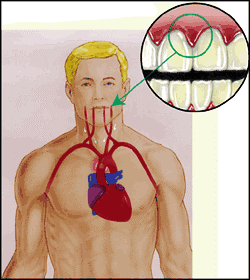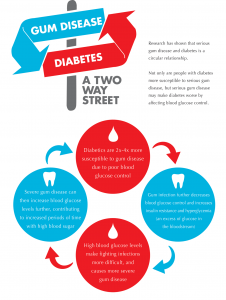Over 75 % of Americans suffer from gum disease. And while most people understand the importance of maintaining healthy gums and teeth, many do not know that gum disease is a potentially life-threatening condition that can affect not only the mouth, but also the entire body. Did you know that periodontal (gum) health and systemic (whole body) health are interrelated? Conversely, periodontal disease is linked to a number of systemic diseases. Periodontal disease has even been associated with such conditions as an increased risk of pregnancy complications, diabetes, and cardiovascular disease. Why is this?
Gums serve as an important barrier that helps keep harmful, inflammation-inducing pathogens (bacteria) from entering the bloodstream. This is an important function, since just a drop of saliva has more bacteria on it than the number of people on this planet.
 If the gums are not healthy, the patient is placed at an increased risk for heart problems such as inffective endocarditis and stroke. Periodontitis is linked to this risk of cardiovascular problems because gum disease allows oral bacteria to enter the bloodstream through the mouth’s many vascular pathways. The bacteria can then travel to organs such as the heart. The pathogens entering the body also inflame and narrow the coronary arteries, causing a defense reaction throughout the body. The result of the bacteria entering the whole body through diseased gums could result in atherosclerosis, coronary artery disease, arrhythmia, heart valve disease, hypertension, endocarditis, or heart failure.
If the gums are not healthy, the patient is placed at an increased risk for heart problems such as inffective endocarditis and stroke. Periodontitis is linked to this risk of cardiovascular problems because gum disease allows oral bacteria to enter the bloodstream through the mouth’s many vascular pathways. The bacteria can then travel to organs such as the heart. The pathogens entering the body also inflame and narrow the coronary arteries, causing a defense reaction throughout the body. The result of the bacteria entering the whole body through diseased gums could result in atherosclerosis, coronary artery disease, arrhythmia, heart valve disease, hypertension, endocarditis, or heart failure.
Research also shows that periodontitis and diabetes typically exist together in a cyclical relationship. Diabetics often experience a thickening of the blood vessels. This thickening slows the flow of oxygen to the mouth tissues that are meant to help clear the mouth of harmful wastes. As a result, gum and bone tissue’s resistance to infection is weakened. Furthermore, high-glucose foods, particularly harmful to diabetics, facilitate germ growth and gum disease. People with poor blood sugar control are more susceptible to tooth loss and severe periodontitis.
So how can we maintain healthy gums and, by extension, a healthy body?
- Get a comprehensive periodontal evaluation to assess your risk factors for periodontal disease.
- Make regular visits to your oral care professional to periodically check on the health of your gums.
- Avoid smoking.
- Practice good oral hygiene at home like brushing thoroughly after eating and flossing daily.
- Maintain a healthy diet with minimal sugar intake.
- Know your personal risk factors for periodontal disease such as age, diet, and genetics.
In conclusion, the better care you take of your gums, the healthier you will be overall! Contact us for an evaluation of your gum health; we look forward to the opportunity to serve you.

For more information on this topic, listen to the Gum Guru Podcast by clicking the link below:
